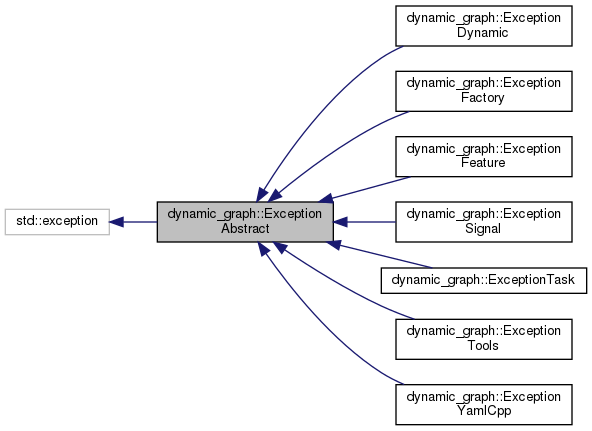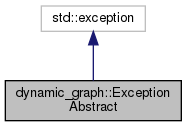Public Types |
Public Member Functions |
Static Public Attributes |
Protected Attributes |
Private Member Functions |
Friends |
List of all members
dynamic_graph::ExceptionAbstract Class Reference
The ExceptionAbstract class. More...
#include <exception-abstract.hh>
Inheritance diagram for dynamic_graph::ExceptionAbstract:

Collaboration diagram for dynamic_graph::ExceptionAbstract:

Public Types | |
| enum | ExceptionEnum { ABSTRACT = 0, SIGNAL = 100, TASK = 200, FEATURE = 300, FACTORY = 400, DYNAMIC = 500, TRACES = 600, TOOLS = 700, PATTERN_GENERATOR = 800, YAML_CPP_PARSING = 900 } |
Public Member Functions | |
| virtual const std::string & | getExceptionName (void) const |
| ExceptionAbstract (const int &code, const std::string &msg="") | |
| int | getCode (void) |
| Access to the error code. More... | |
| const std::string & | getStringMessage (void) |
| Reference access to the error message (can be empty). More... | |
| const char * | getMessage (void) |
| Access to the pointer on the array of char related to the error string. More... | |
| const char * | what () const throw () |
Static Public Attributes | |
| static const std::string | EXCEPTION_NAME = "Abstract" |
Protected Attributes | |
| int | code |
| Error code. More... | |
| std::string | message |
| Error message (can be empty). More... | |
Private Member Functions | |
| ExceptionAbstract (void) | |
| forbid the empty constructor (private). More... | |
Friends | |
| std::ostream & | operator<< (std::ostream &os, const ExceptionAbstract &err) |
| Print the error structure. More... | |
Detailed Description
The ExceptionAbstract class.
Constructor & Destructor Documentation
◆ ExceptionAbstract()
|
private |
forbid the empty constructor (private).
Member Function Documentation
◆ getCode()
| int ExceptionAbstract::getCode | ( | void | ) |
Access to the error code.
◆ getMessage()
| const char * ExceptionAbstract::getMessage | ( | void | ) |
Access to the pointer on the array of char related to the error string.
Cannot be NULL.
◆ getStringMessage()
| const string & ExceptionAbstract::getStringMessage | ( | void | ) |
Reference access to the error message (can be empty).
Friends And Related Function Documentation
◆ operator<<
|
friend |
Print the error structure.
Member Data Documentation
◆ code
|
protected |
Error code.
- See also
- ErrorCodeEnum
◆ message
|
protected |
Error message (can be empty).
The documentation for this class was generated from the following files:
- include/dynamic_graph_manager/exception/exception-abstract.hh
- src/exception/exception-abstract.cpp
